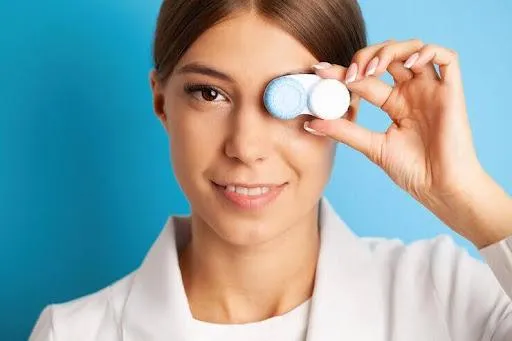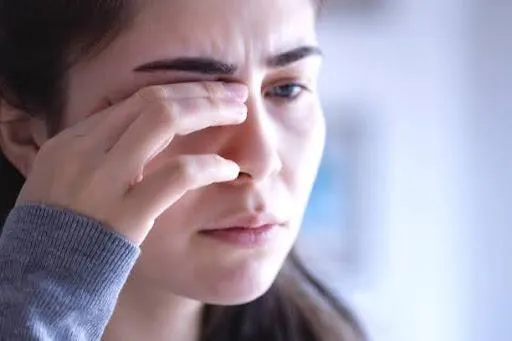Eye Health
The Do’s and Don’ts of Contact Lens Care
FSDAVCFEBFEVSDDVFSD
FSDAVCFEBFEVSDDVFSD
FSDAVCFEBFEVSDDVFSD
Why lens care is important
Contact lenses are a safe and effective vision solution, but only if they’re cared for properly. Poor hygiene can lead to eye infections, dryness, or even corneal ulcers. Even small contact lens mistakes, like not washing your hands before handling lenses, can cause irritation or bacterial buildup. Keeping your contact lenses clean and following professional guidelines is essential.
Improper habits such as sleeping in lenses or rinsing them with water can increase risks to eye health. Many contact lens wearers don’t realize how harmful these shortcuts can be. By knowing what to do—and what to avoid—you’ll protect your vision and comfort while keeping your lenses working well.
Contact lenses are a safe and effective vision solution, but only if they’re cared for properly. Poor hygiene can lead to eye infections, dryness, or even corneal ulcers. Even small contact lens mistakes, like not washing your hands before handling lenses, can cause irritation or bacterial buildup. Keeping your contact lenses clean and following professional guidelines is essential.

Improper habits such as sleeping in lenses or rinsing them with water can increase risks to eye health. Many contact lens wearers don’t realize how harmful these shortcuts can be. By knowing what to do—and what to avoid—you’ll protect your vision and comfort while keeping your lenses working well.

Do’s of contact lens care
Wash your hands thoroughly with soap and water before handling your contact lenses. Dry them with a clean, lint-free towel to avoid transferring dust, oils, or particles onto the lenses. Clean hands are your first defense against eye infections and help keep your lenses comfortable and clear throughout the day.
If you use bi-weekly or monthly lenses, clean them daily with a fresh multipurpose solution. Even if the packaging says “no-rub,” gently rubbing your lenses helps remove protein, oils, and debris more effectively. Always use the solution recommended by your eye doctor to ensure it’s safe for your lenses and eyes.
Proper storage is just as important. Store your lenses in a clean case filled with fresh solution, and never reuse or top off old solution. Let your lens case air-dry after each use, and replace it every one to three months to avoid bacterial buildup. Follow your optometrist’s replacement schedule carefully: daily lenses should be discarded daily, and monthly lenses replaced every month without exceptions. Consistent, proper care protects your eye health and ensures your lenses stay comfortable and effective by following contacts hygiene best practices.
Don’ts that harm your eyes

Never sleep in contact lenses unless your doctor says it’s safe for the type you use. Sleeping in lenses reduces oxygen flow to the eyes, increasing infection risk. Many complications occur when lenses are overworn or not removed overnight as recommended. Proper wear time is essential to keep your eyes healthy and comfortable. Ignoring these guidelines can lead to serious issues like corneal ulcers and inflammation.
Avoid wearing contact lenses while swimming or showering because water can introduce harmful bacteria such as Acanthamoeba, which may cause severe corneal infections.

If your lenses get wet, remove and disinfect them immediately. Never reuse solution or clean your lenses with tap water, saline, or rewetting drops, as these don’t disinfect properly and won’t kill germs effectively. Following these contact lens care tips protects your eyes and keeps your lenses safe and comfortable for daily use.
Using expired solution, keeping lenses past their recommended use, or ignoring irritation can all lead to serious complications. Expired solution loses its effectiveness in disinfecting lenses, increasing the risk of bacterial or fungal infections. Similarly, wearing lenses beyond their recommended lifespan can cause discomfort, dryness, and damage to the eye’s surface. It’s essential to follow the replacement schedule provided by your eye care provider to maintain contact lens cleaning standards.
If your eyes feel uncomfortable, red, or sensitive to light, stop wearing your lenses immediately and contact your eye care provider. These symptoms may be early signs of infection or other eye problems that require prompt attention. Ignoring irritation or discomfort can worsen eye conditions and potentially lead to more severe issues, such as corneal ulcers or vision loss. Prioritizing eye health by addressing symptoms early helps ensure safe and comfortable contact lens wear.
When to take a break
Your eyes need time to breathe, especially if they’ve been irritated or dry. Taking a break from contact lenses can help your eyes recover and maintain overall comfort. Switching to glasses for a day or two gives your eyes rest and reduces the risk of extended irritation. Regular breaks also support long-term eye health by preventing dryness and discomfort caused by continuous lens wear.
If you notice redness, dryness, or blurry vision while wearing your contacts, it’s a signal that something may be wrong. Don’t ignore these signs. Remove your lenses immediately, clean them thoroughly, and let your eyes relax. If symptoms persist, consult your optometrist to ensure there’s no underlying problem. Addressing these issues early helps prevent more serious complications and keeps your eyes healthy and comfortable.
Essential Tips for New Contact Wearers
Getting used to contact lenses can take time, but building the right habits early will set you up for success. Start with a consistent routine for inserting, cleaning, and removing your lenses. Doing it at the same time each day helps make it a natural part of your schedule.
Always follow the specific instructions your eye doctor provides for your lens type. Don’t rely on general internet advice—each lens brand or type may have different care requirements. Proper handling protects your eye health and lens performance.
Getting used to contact lenses can take time, but building the right habits early will set you up for success. Start with a consistent routine for inserting, cleaning, and removing your lenses. Doing it at the same time each day helps make it a natural part of your schedule.
Always follow the specific instructions your eye doctor provides for your lens type. Don’t rely on general internet advice—each lens brand or type may have different care requirements. Proper handling protects your eye health and lens performance.


Pay close attention to how your eyes feel. If you notice discomfort, redness, or blurry vision, stop wearing your lenses and contact your eye doctor. Addressing small issues early can prevent more serious problems and keep your eyes healthy.
What your eye doctor can provide
Your optometrist isn’t just there to prescribe lenses—they’re your partner in keeping your eyes healthy. During a contact lens exam Spring TX, your doctor will evaluate your corneal health, tear production, and lens fit. This thorough process helps determine the safest and most comfortable type of contact lenses for your specific eye needs. A proper fit and accurate assessment ensure not only better vision but also long-term eye safety and comfort.
If you're experiencing discomfort, dryness, or blurry vision with your current lenses, it may be time to reassess your lens type or care routine. Your doctor can recommend a different brand, change your cleaning solution, or suggest specialty lenses tailored for conditions like astigmatism, dry eye, or seasonal allergies. Regular checkups are critical, as they allow your provider to detect potential problems early—even before noticeable symptoms appear.
You should also use your appointments to ask questions about how to clean contacts, storage tips, and lens replacement schedules. There’s no need to rely on trial and error. Your eye care provider can walk you through the best practices and suggest products that work well with your lifestyle. Good habits begin with accurate, personalized information.
In some cases, daily disposable contact lenses may be a better option, especially if hygiene or convenience is a concern. These lenses eliminate the need for cleaning and reduce the risk of infection. Following your provider’s advice ensures safe, effective, and comfortable lens use. Maintaining open communication with your optometrist is key to protecting your vision and making the most out of your contact lens experience.
Building Healthy Contact Lens Habits Daily
Good contact lens care is all about consistency. It doesn’t take much time, but making it a daily habit is the best way to protect your vision. Create a short checklist if needed—wash hands, clean lenses, store them correctly, and change the solution daily. These small steps make a big difference in your eye health.
Replace your case and solution as recommended. Don’t wait until something feels off to make a change. Preventative care is much easier than treating an eye infection or irritation that could have been avoided. Being proactive keeps your lenses—and your eyes—in better condition over time.

Good contact lens care is all about consistency. It doesn’t take much time, but making it a daily habit is the best way to protect your vision. Create a short checklist if needed—wash hands, clean lenses, store them correctly, and change the solution daily. These small steps make a big difference in your eye health.
Replace your case and solution as recommended. Don’t wait until something feels off to make a change. Preventative care is much easier than treating an eye infection or irritation that could have been avoided. Being proactive keeps your lenses—and your eyes—in better condition over time.
If you’re frequently on the move or prefer not to wear glasses, multifocal contacts offer more freedom and convenience. They provide clear vision at multiple distances without the need for switching glasses, making them ideal for active lifestyles.
Stick to your schedule. Whether you use daily, weekly, or monthly lenses, staying consistent prevents buildup and extends the life of your lenses. Good habits lead to comfortable, safe lens use every day and reduce the chances of developing problems that could interrupt your routine or affect your vision.
Final thoughts on contact care
Taking care of your contact lenses isn’t complicated, but it does require attention and consistency. Clean hands, proper storage, and routine replacements help protect your eyes from discomfort and serious infections. Simple daily habits—like using fresh solution and keeping your lens case clean—can prevent most common issues. Sticking to your care routine supports both eye health and lens performance.
If you’re unsure about your lens care routine, ask your optometrist for guidance. Making small improvements to your hygiene practices can help your lenses last longer and your eyes feel more comfortable. Every lens type has specific care needs, and your doctor can recommend what’s best. Don’t rely on general advice or online guesses—professional input makes a big difference. Good habits lead to great vision and ensure wearing contact lenses stays safe, effective, and comfortable. For any concerns or questions, contact us today.

Contact Info
Hours of Operation
Mon - Fri | 9:00 AM - 5:00 PM
Sat - Sun | Closed
Holiday Hours: We are closed for the following holidays: New Years Day, Memorial Day, Independence Day, Labor Day, Thanksgiving Day, Christmas Day
© 2026 Kleinwood Vision. All rights Reserved.


